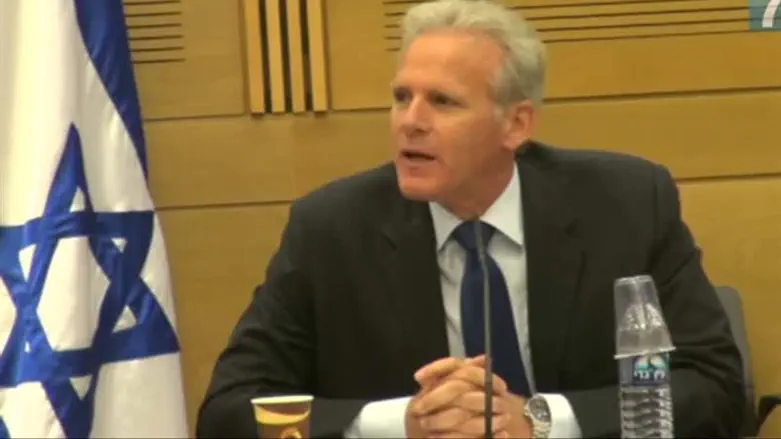
Deputy Public Diplomacy Minister Michael Oren (Kulanu), who also served as Israel's ambassador to the US between the years 2009-2013, gave an exclusive interview to Arutz Sheva on Saturday night.
In his interview with Arutz Sheva, Oren said he estimates the Obama administration has not yet had its last word with regards to Israel. He also harshly criticized US behavior in the UN on the resolution condemning the "settlements."
"This is abandonment and betrayal. Betrayal of us - but not only of us. It's a betrayal of all of Israel's allies. Every country which considers itself an ally of the US must ask itself if it can continue to rely on the US. Because if the US is willing to abandon its only democratic ally in the Middle East, we need to wonder how it would act towards its allies in other parts of the world," Oren said in the interview.
"The US has violated its bipartisan policy of fifty years. The unambiguous policy is that there is no substitute for direct negotiations between Israel and the Palestinians. This is a policy which President Obama himself promised to abide by in 2011, when National Security Adviser Susan Rice was still serving as UN Ambassador. Rice herself said there is no substitute for direct negotiations, there was no place in the UN to hold those negotiations, and the US should not dictate a solution to Israel."
Regarding his own reaction to the UN's resolution, Oren said, "I feel great sadness when I think about the UN Security Council's decision. I also see it as a severe and grave decision. This is a decision which defines half a million Israeli citizens as international criminals and the Western Wall as 'occupied territory.' It opens the door to sanctions against Israel. As a nation and as a country, we need to stand united against this decision, BDS, and delegitimization of all types.
"This decision ignores the Palestinian leaders' refusal to recognize Israel as a Jewish state, and it ignores their refusal to sit with us at the negotiating table. This is a one-sided decision, which might even be called racist against Jews," Oren said.
When asked if he believed the US had taken an active role in ensuring the resolution would pass, Oren said, "I find it hard to believe otherwise. From my sources - and they are senior officials - that is exactly what happened. But even more, I know from about 40 years of experience in the field these processes don't happen on their own. They happen when someone puts focused energy into bringing countries to vote. It's difficult, if not impossible, to believe this happened without the aid of the US government."
When Oren was asked if this was what PM Netanyahu was afraid of, and if Obama could do anything else in his remaining three weeks, Oren did not answer directly.
"Today Secretary of State John Kerry said he plans to give a detailed speech explaining who caused the argument and who caused the negotiations to fail. His speech will also include what he sees as a solution. I'm pretty sure I can guess what he'll say in his speech," Oren said.
"This won't box in Trump's administration. What it will do is cause the horse to run out of its stable, so to speak. Condemning settlements and blaming Israel for violating international law is no longer in the hands of the US - it's in the hands of the UN. The UN can now use these accusations to sue Israel in the Hague International Court, and to sanction and boycott Israel.
"We need to keep watch, and to augment our legal defenders, so they can properly protect us. We need to spend money and resources on a political 'Iron Dome,' not just a physical one. We need to invest more in skilled people who know how to fight boycotts. And we need to recognize the fact we are preparing for a war, as we know how to do so well. We have overcome greater threats in our past, and we're still here, lighting the first Hanukkah candle. This holiday reminds us of how we overcame similar difficulties in the past, and how we will overcome them now and in the future.
"President-elect Trump tweeted his intention to get even with the UN. There's precedent for that. The US ceased funding UNESCO after it agreed to recognize a Palestinian state. And it was Obama who made the decision to stop funding UNESCO. There are precedents for it, and the UN is very dependent on US funding, it's their weak spot. And maybe that's something which should make us feel hopeful," Oren concluded.
